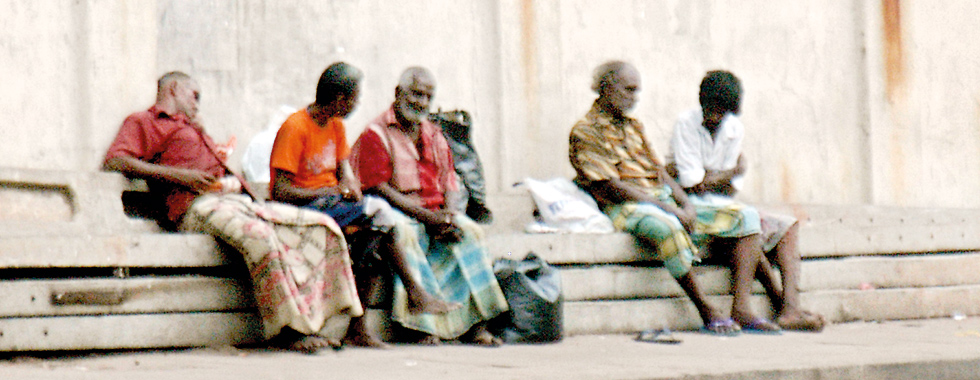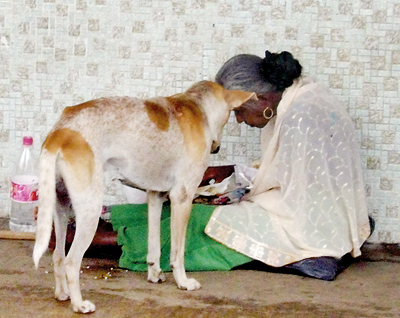Beggars an endangered species in Colombo, suburbs for CHOGM
Society’s public ‘eye sore’ disappears into and overcrowds a detention centre, to a fate yet to be determined
Ahead of the Commonwealth Heads of Government Meeting (CHOGM) in Colombo in November, an operation to rid the City of beggars has got under way. By Friday, 128 beggars who were held at the Colombo Remand Prison, have been moved to the Detention Centre in Ridiyagama, Ambalantota, officials said.

Pix by Nilan Maligaspe
The recent transfer on court orders, of 128 beggars, including 26 females has raised concerns among sociologists. Prisons Spokesman Gamini Kulathunge said that most of those transferred were from the streets of Colombo. The Sunday Times learns that one of the beggars had US dollars 1383 in possession. Other valuables include cash and pricey mobile phones.
Head of Sri Jayewardenepura University’s Sociology and Anthropology Dept, Dr. Praneeth Abeysundare said that, as the beggar-community has been neglected and not monitored, criminals, sex workers and drug addicts have blended with the genuine beggars.
“Some beggars make more money than employed persons, which has resulted in those with the ability to work, opting to beg for a living, which should be discouraged,” Dr. Abeysundare said.
Colombo University’s Senior Professor of Sociology, Siri Hettige said that, instead of moving beggars to a detention centre constructed during the 1976 non-aligned summit, the State should ensure proper programmes to rehabilitate them. “Every time an international event approaches, the country cannot hide its beggars, but must seek a permanent solution. Beggars are supposed to represent the lowest stratum within society, and the issue is not addressed by Samurdhi, the poverty alleviation programme that allocates Rs. 9 billion for the poor, which should be more streamlined,” he said.

Prof Hettige said that there is a need to research more on the present beggars to identify the genuine paupers. “Universities should be given more research opportunities. Once they are identified, the State should provide with them with occupational training and social housing schemes,” Prof Hettige said.
According to the professor, unlike many countries where the Social Services Ministry plays the main role in the welfare of all citizens, here the corresponding Ministry is hardly considered an important one. The Ridiyagama Detention Centre, in Ambalantota has 586 inmates with 212 females.
The Detention Centre’s Superintendent Mahinda Wijesinghe said the 128 additional persons has overcrowded the detention centre.
“The buildings are in a dilapidated state. Its present capacity is for 600 inmates. We are doing our utmost to work for their benefit,” he said.
“The buildings are in a dilapidated state. Its present capacity is for 600 inmates. We are doing our utmost to work for their benefit,” he said.
As most of the inmates do not have guardians, the Detention Centre also acts as a shelter for elders as well as the destitute, with medical attention and board managed with the funds allocated by the Southern Provincial Council (PC). Unfortunately, the Social Services ministry does not concern itself with the issue of beggars.
“The beggars’ issue has to be handled by each PC and not the central government. The central ministry only handles disabled, elders and single parents’ programmes,” said the Social Services Ministry Secretary Emelda Sukumar. Southern Province’s Social Welfare Ministry’s Secretary Sumith Alahakoon said that, after several requests, the Finance Commission has agreed to allocate Rs 7 million for the refurbishment of the Detention Centre.

